by [email protected] | Nov 8, 2023 | Prescriptions for your Practice
Podcast: Play in new window | Download
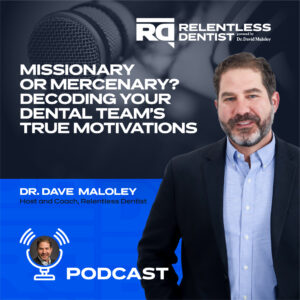 Are you a dental practice owner looking to foster a team culture that’s rooted in passion rather than just profit?
Are you a dental practice owner looking to foster a team culture that’s rooted in passion rather than just profit?
This week, we’re exploring the “Mercenary vs. Missionary” mindset with guidance from John Doerr, the legendary venture capitalist. His insights help us understand the crucial differences between team members who operate out of self-interest and those who are driven by a shared vision and dedication to your practice’s success.
- Delve into Doerr’s perspective on why a missionary-driven team is the cornerstone of long-term success and patient satisfaction.
- Learn actionable steps to inspire a shift in your team’s mindset, leading to improved care, stronger team cohesion, and enhanced practice growth.
- Discover how to identify mercenary traits and strategically transform them into missionary zeal that aligns with your practice’s core values.
For dental practice owners seeking to create a lasting impact and drive genuine success, this episode is your playbook.
Tune in and learn how to lead your team towards a future where dedication and passion are the driving forces.
Subscribe, rate, review, and share this episode with peers who are just as dedicated to cultivating a thriving, mission-driven dental practice.
P.S. Reveal the hidden potential in your dental practice. Take the Dentists Ascend Quiz for your customized results.
Key Quotes:
- Misalignment affects team potential, workloads, patient care, and overall practice success.”
- “Transforming your team from mercenaries to missionaries creates passion and alignment.”
- “Exceptional patient care leads to stronger patient relationships and a thriving dental practice.”
- “Passion can be cultivated from curiosity and leads to consistency of purpose.”
- “The journey from mercenary to missionary mindset requires patience, persistence, and strong leadership.”
Featured on the Show:
- People: John Doerr, an American investor and venture capitalist at Kleiner Perkins in Menlo Park, California.
- People: Mark Cuban, an American billionaire businessman, film producer, investor, and television personality.
- I appreciate your feedback. Let me know what you learned and loved here: [email protected].


by [email protected] | May 24, 2023 | Prescriptions for your Practice
Podcast: Play in new window | Download
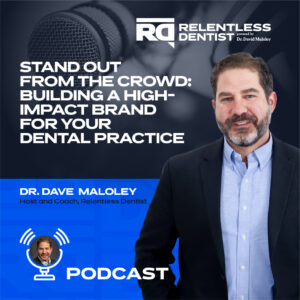 Would you rather be compensated for who you are or what you do? It’s a question worth pondering as you embark on your journey to differentiate yourself in the dental industry.
Would you rather be compensated for who you are or what you do? It’s a question worth pondering as you embark on your journey to differentiate yourself in the dental industry.
It’s time to go beyond offering exceptional dental services and create a unique identity that resonates with your target audience. By investing in who you are as a dental practice, you will attract patients who value your unique qualities and are willing to pay a premium for your services.
In this episode, I discuss why this is a really bad time to be “just another dentist.”
- So if you want to know what it takes to increase your revenue with less effort …
- If you’re ready to design your practice’s essence and how it’s perceived by patients …
- If you want to be in a category of one in your community so you can get paid more and take more time off…
Tune in now!
Listen in and find solutions to common practice issues at Prescriptions for Your Practice.
Join The Leading Dentist Collective – the free collaborative community for single-location dental practice owners who want to unleash their people, profits, and purpose.
Key Quotes:
- “Without a clear brand, identity, and messaging, these same practices are gonna fail to establish a memorable and consistent patient experience, resulting in reduced patient loyalty and engagement.”
- “A weak brand fails to build trust and credibility, making it harder to persuade potential patients to choose your services, AKA case acceptance.”
- “A dental practice with a high-impact brand enjoys several advantages. It stands out in the competitive market, attracting more attention and interest from potential patients.”
- “A strong brand establishes trust, credibility, and a positive reputation, making it easier to convert interested individuals into loyal patients.”
- “A high-impact brand fosters patient loyalty and advocacy, resulting in word-of-mouth referrals that reduce marketing costs and increase revenue growth opportunities.”
Featured on the Show:
- People: Dan Kennedy, author and founder of Magnetic Marketing
- People: John Jantsch, author of “Duct Tape Marketing”, speaker, and marketing consultant
- Organization: Nike, a multinational corporation known for its athletic footwear and apparel
- Organization: Apple, a technology company known for its innovative products and sleek design
- Organization: Deloitte, an international professional services network
- Publication: Harvard Business Review, a general management magazine published by Harvard Business Publishing
- Movie: Air
- I appreciate your feedback. Let me know what you learned and loved here: [email protected].


by [email protected] | Jan 18, 2023 | Prescriptions for your Practice
Podcast: Play in new window | Download
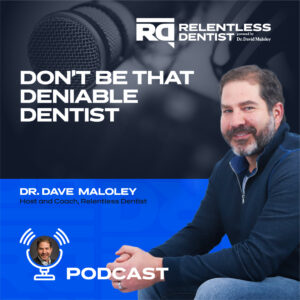 The misconception that influence is something you either possess or lack can lead to feelings of being overlooked and denied. However, influence is a skill that can be developed and used in combination with your clinical expertise to drive successful case acceptance and patient referrals.
The misconception that influence is something you either possess or lack can lead to feelings of being overlooked and denied. However, influence is a skill that can be developed and used in combination with your clinical expertise to drive successful case acceptance and patient referrals.
Today, let’s talk about overcoming the challenges of failed case acceptance, lack of patient referrals, and negative reviews by embracing the power of influence.
Dentists: do you ever feel like your patients are ignoring you?
- If you want to become the most referable dentist around…
- If you want to start bigger cases…
- If you want to know who your patients want to give their business to so that you can make it easy for them to say YES!
Tune in now!
Listen in and find solutions to common practice issues at Prescriptions for Your Practice.
Join The Leading Dentist Collective – the free collaborative community for single-location dental practice owners who want to unleash their people, profits, and purpose.
Key Quotes:
- “I feel like our industry needs a more robust discussion about people’s problems. That’s the heart of what’s going on now because people are getting more and more complex, and I think there needs to be a place for meaningful discussion to solve these.”
- “Influence is really a skill. And if you can appreciate that, it’s a skill of being able to cause change, then you can develop it as a skill and use it synergistically with the clinical skills that you have developed and are continuing to develop.”
- “It’s a great dichotomy of leadership and influences that you increase your power by reducing it.”
- “The better that we are at creating a great experience in delivering clinical excellence, the more we receive as a team.”
Featured on the Show:


by [email protected] | Dec 28, 2022 | Uncategorized
Podcast: Play in new window | Download
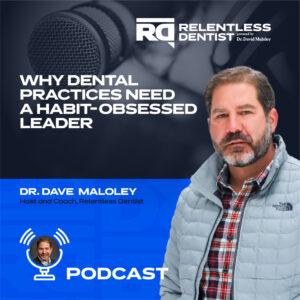 “We are what we repeatedly do… therefore excellence is not an act, but a habit.” — Will Durant
“We are what we repeatedly do… therefore excellence is not an act, but a habit.” — Will Durant
Habits are a powerful influence that affects our actions and outcomes. If you’re passionate about habits, you understand how important it is to form positive habits that lead to success. However, even if you are not habit-obsessed, developing a habit-based leadership philosophy can have a significant impact on you, your team, and patient care. Focusing on the habits that need to be stopped, sustained, and started can result in improved results in many aspects of life, like profitability, productivity, and patient care. Welcome to the world of habit-based leadership – let’s explore the potential it holds!
In this episode, I discuss the minuscule habits that lead to a massive impact.
- So if you want to build the two critical habits that enhance your team’s morale and productivity…
- If you want to capitalize on habits that create. an unfair advantage for your dental practice…
- If you want to grow your leadership skills and confidence so you can make 2023 your most profitable, enjoyable year yet…
Tune in now!
Listen in and find solutions to common practice issues at Prescriptions for Your Practice.
Check out our New Case Study, “Discover How To Recession-Proof Your Dental Practice In The Next 60 Days So That You Increase Profits & Avoid Losing Key Team Members” now at: http://thenorecessiondentist.com/casestudy.
Key Quotes:
- “Working harder isn’t working.”
- “There’s a time and a place to make sure that we’re working very smart as well.”
- “Leadership and practice potential is a reflection of your habits.”
- “The payoff of new habit installation is always delayed.”
- “The thing that you are most committed to, the thing that I’m most committed to is our identity, and confidence elevates that identity.”
- “Make sure that you’re working on productive habits and building your confidence simultaneously because they’ll start to synergize.”
- “An innovation habit and a communication habit turn your team’s frustration into the raw material for growth and reduced stress.”
- “Make sure that you’re upgrading your habits, and that makes you more clear, energetic, and courageous because that makes you a more influential role model. And then that allows you to wield the tools of influence to impact these people in a hugely positive way.”
Featured on the Show:


by [email protected] | Nov 23, 2022 | Prescriptions for your Practice
Podcast: Play in new window | Download
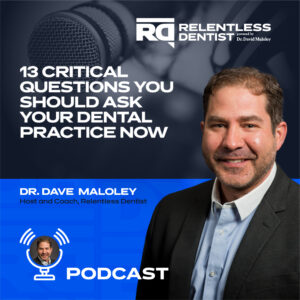 “You never know who’s swimming naked until the tide goes out.” ― Warren Buffett
“You never know who’s swimming naked until the tide goes out.” ― Warren Buffett
As a dental practice owner, you know that the success of your business depends on providing high-quality care to your patients. But to do that, you need to have a well-run operation. Identifying areas that need improvement and making changes will help your business thrive.
Dental Practice Owners: Let’s take a closer look at your Drivers, Demands, Disciplines, & Decisions.
- If you want to know why it’s essential to “romance” your dental practice . . .
- If you want to edit your team before culture cancer sets in . . .
- If you want to get real about your reputation with patients and the respect of your team so you can ensure growth in a cruddy economy . . .
Tune in now!
Listen in and find solutions to common practice issues at Prescriptions for Your Practice.
Check out our New Case Study, “Discover How To Recession-Proof Your Dental Practice In The Next 60 Days So That You Increase Profits & Avoid Losing Key Team Members” now at: http://thenorecessiondentist.com/casestudy.
Key Quotes:
- “We appreciate, as dental practice owners, that it’s a time to be romancing your practice because unless you show it some love and attention, it’s not gonna love you back. It’s gonna get frustrating. It’s gonna get irritating.”
- “Romance is like to court to give your business the love and attention it needs.”
- “All business growth is really personal growth, plain and simple.”
- “You should have a habit of getting your team engaged in helping you as an organization better your best month ever.”
- “Your job, of course, is to coach the team so they’re in a perpetual learning state — that’s leadership. Supporting people and helping them grow — that is modern leadership.”
- “If you don’t have the respect of your team, it’s gonna be really hard to keep a great reputation with your patients.”
- “If you have 17 priorities, you have no priorities.”
- “My goal is for you to do less work and have more money, time, and freedom as your career continues.”
Featured on the Show:
- People: Sam Bankman-Fried, entrepreneur
- People: Warre Buffett, entrepreneur
- People: Phil Stutz, psychiatrist
- People: Verne Harnish, author
- Documentary: Stutz, Netflix
- Book: The Tools: 5 Tools to Help You Find Courage, Creativity, and Willpower–and Inspire You to Live Life in Forward Motion, Barry Michels & Phil Stutz
- Book: Coming Alive: 4 Tools to Defeat Your Inner Enemy, Ignite Creative Expression & Unleash Your Soul’s Potential, Barry Michels & Phil Stutz
- I appreciate your feedback. Let me know what you learned and loved here: [email protected].


 Are you a dental practice owner looking to foster a team culture that’s rooted in passion rather than just profit?
Are you a dental practice owner looking to foster a team culture that’s rooted in passion rather than just profit?





